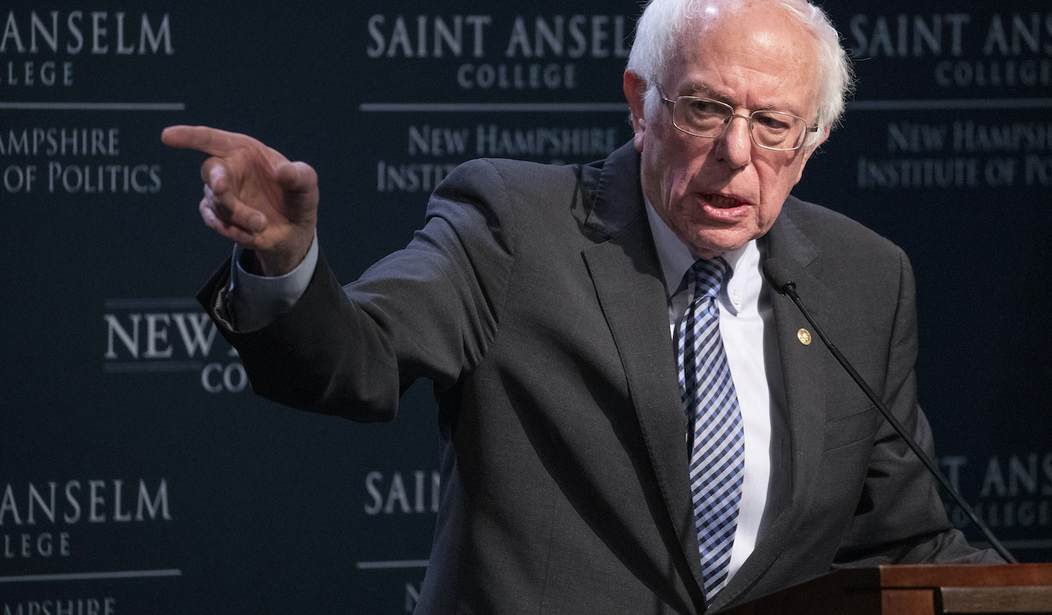Back in 2016, Sen. Bernie Sanders (I-Vt.) shook up the Democratic primary by running to Hillary Clinton’s left on many issues, including the $15/hour minimum wage. He lost the 2016 primary and he lost the 2020 primary, but Sanders may have discovered a roundabout way to attain his ultimate goal by helping to create a labor shortage.
In June, more than 9.5 million Americans were looking for work, according to the Bureau of Labor Statistics. At the same time, job openings hit a new record high at 9.2 million. Many employers struggle to find workers due to a skills gap, but workers are also less willing to go back to work because the federal government is paying them more in unemployment benefits.
Back in March 2020, after a slew of Democrats had teamed up to endorse Joe Biden, leaving Sanders increasingly weak, the self-described “democratic socialist” championed an unemployment surplus for the first COVID-19 relief bill, the CARES Act, which President Donald Trump later signed. The Sanders proposal would pay unemployed workers $300 per week in addition to normal benefits.
Republicans raised the alarm. “We cannot encourage people to make more money in unemployment than they do in employment,” Sen. Tim Scott (R-S.C.) declared at the time. A Heritage Foundation study found that the Sanders unemployment handout would cost 13.9 million jobs and $1 trillion in gross domestic product (GDP).
Recommended: Hey Bernie, It Turns Out Paying People More Not to Work Than to Work Is a Bad Idea
Yet Sanders dismissed these “anti-worker objections,” threatening to block the bill if it did not include the unemployment surplus. Bernie Sanders got his wish, and business owners started complaining about how difficult it was to find workers. The unemployment increase continued throughout the pandemic and the Democrats’ $1.9 trillion blue pork bill masquerading as a “COVID-19 relief” stimulus kept these inflated unemployment checks coming. Many workers make more money without a job than they did when they had one.
When a business owner asked Biden about the situation in a CNN town hall on Wednesday night, the president bluntly said that businesses are going to be “in a bind for a little while,” and he suggested they increase wages to $15/hour.
“How do you and the Biden administration plan to incentivize those that haven’t returned to work yet? Hiring is our top priority right now,” John Lanni, an Ohio restaurant group owner, asked the president. He noted that his industry continues to struggle finding workers.
Biden replied that the restaurant and tourism businesses are going to be in “a bind for a little while,” partly because many workers are taking advantage of new opportunities and higher wages. He noted that Lanni’s workers could be making $15/hour or more.
Elsewhere during the town hall, Biden admitted that “being able to provide for unemployment insurance has kept people from going back to work.”
Indeed, an Axios poll found that 13 percent of respondents who said they had turned down jobs recently said they did so because they “receive enough money from unemployment insurance without having to work.” Another 12.1 percent said they rejected a job because “I was not given enough money to return to work.”
Businesses find it difficult to compete with a federal government that has artificially inflated wages by cutting bigger unemployment checks.
At least one Biden advisor said the quiet part out loud. On Monday, Biden’s top economic adviser, Brian Deese, told Yahoo Finance that companies can address the labor shortage by offering “fair wages.”
“We have to recognize that we are coming out of a truly unique pandemic,” Deese said. “At the same time, if businesses pay a fair wage, if they offer benefits, we’re confident that they’re going to find workers when they need them.”
In other words, businesses have no choice. When the government cuts lavish unemployment checks to former workers, businesses have to pick up the slack in order to coax them to come back to work.
Bernie Sanders may have found a way to force companies to increase wages to $15/hour without a direct federal mandate. Unfortunately for everyone involved, when the government prints money in this way, it drives real wages down through inflation. Inflation works as an insidious tax that robs the middle class while helping the federal government. The ominous warning signs of inflation are getting worse, and Biden seems to think that he can solve the problem by printing more money.
Recommended: Biden’s Response to the Ominous Specter of Inflation Should Set Off More Alarm Bells
Americans should celebrate if wages increase because workers become more efficient or because employers find better ways to reward their workers. Yet when the government pulls the strings to force employers to artificially increase wages, that creates economic dislocation and other unintended consequences, such as inflation.
Bernie Sanders may have pulled the strings to push the economy closer to a de facto $15/hour minimum wage, but at what cost?









Join the conversation as a VIP Member